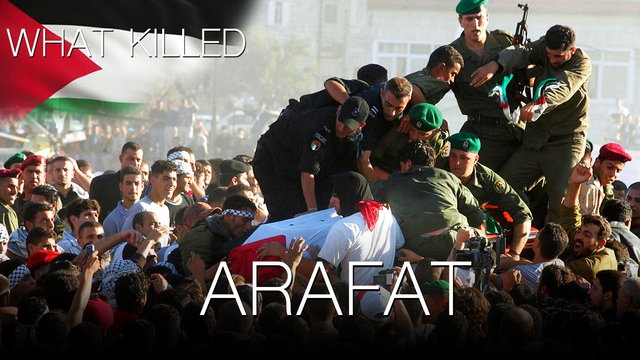In 2004 Yasser Arafat suddenly fell mysteriously ill. Doctors from around the world rushed to save him but he died within weeks and ever since it's been an unsolved case. It was convenient timing for Israel and the US who wanted him out of the way. But no investigation followed. This investigative doc made the news worldwide when it recruited forensic scientists and discovered traces of a deadly radioactive poison on his clothes. Was Arafat murdered?
Eight years after Yasser Arafat's sudden death, rumours of assassination still ring in the ears of his family and countrymen. In this exclusive and riveting follow up documentary of Arafat's exhumation, the controversy of conspiracy that was first re-ignited by Al Jazeera begins to blaze, and the cause of Arafat's death is finally revealed.
October 2012. 4 months after Al Jazeera's documentary of Suha Arafat's quest for truth was aired, and scientists pointed out the urgent need to exhume Arafat's body to recover rapidly decaying evidence. The mausoleum remains untouched, as do the questions lingering around the ex-president's death. Corners of the Palestinian Authorities resist an exhumation, fearing an autopsy would have turned
"a martyrdom case into a police criminal case", as one official describes. Tawfiq Tblazeirawi, Palestinian Investigation Committee Chief, says stubbornly:
"Nobody forces their demands on me". They will not be rushed.
Upon their return to Palestine, Al Jazeera are closely tailed, and the anxiety of the Authorities is unmistakeable, if not understandable. If poisoned, there is a possibility that one of Arafat's inner circle was used as a tool by the Israelis. With time ticking and pressure mounting, the Authorities finally grant permission for the exhumation in November 2012. The grave is opened and forensic experts begin analysis on samples from Arafat's body.
A year on and conflicting results are revealed. Whilst a Russian team, in peculiar circumstances, reports unusually low levels of polonium, a Swiss forensic team detect levels up to 36 times those of normal within the remains. Arafat's widow and daughter listen to the results in tears, as polonium poisoning is declared
"beyond any doubt".
"You revealed the crime of the century", says a teary-eyed Suha Arafat. The only question remaining is that of the enemy within: as Professor Barclay notes,
"We have a smoking gun. We've just got to find out... who was holding that gun".
LEARN MORE.
WATCH MORE.
JOIN THE DISCUSSION.
 In 2004 Yasser Arafat suddenly fell mysteriously ill. Doctors from around the world rushed to save him but he died within weeks and ever since it's been an unsolved case. It was convenient timing for Israel and the US who wanted him out of the way. But no investigation followed. This investigative doc made the news worldwide when it recruited forensic scientists and discovered traces of a deadly radioactive poison on his clothes. Was Arafat murdered?
In 2004 Yasser Arafat suddenly fell mysteriously ill. Doctors from around the world rushed to save him but he died within weeks and ever since it's been an unsolved case. It was convenient timing for Israel and the US who wanted him out of the way. But no investigation followed. This investigative doc made the news worldwide when it recruited forensic scientists and discovered traces of a deadly radioactive poison on his clothes. Was Arafat murdered?




